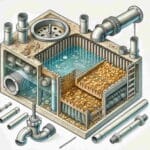How to Choose the Right Grease Trap for Your Business
In the bustling food and hospitality industry, efficiency is everything. One crucial yet often overlooked aspect of maintaining a smooth operation is choosing the right grease trap for your business. With the proper setup, a grease trap can prevent clogs, improve kitchen flow, and keep you in compliance with local health and safety regulations. But here’s the catch: not all grease traps are created equal, and the best choice often depends on the unique needs of your business. So, what exactly should you consider when looking for a reliable grease trap service near me?
This guide dives into different types of grease traps, factors to weigh when choosing one, and practical tips on keeping your grease trap in peak condition. By the end, you’ll have a clear path to finding the best solution for your business.
Types of Grease Traps: An Overview
When it comes to grease traps, choosing the right type can make a world of difference. Let’s break down three main options and how they serve different needs.
1. Passive Grease Traps
- What They Are: Passive grease traps are small, often tank-like units installed beneath sinks or in floor drains. They separate grease and solids from wastewater by allowing them to float to the top.
- Pros: Affordable and relatively easy to install. Ideal for smaller kitchens or businesses with minimal grease output.
- Cons: These traps require regular manual cleaning to function effectively. If neglected, they can lead to blockages, odor issues, and even fines from health inspectors.
- Best For: Small cafes, bakeries, or food service businesses with low-to-moderate kitchen activity.
2. Automatic Grease Removal Units (AGRU)
- What They Are: Unlike passive traps, AGRUs automatically separate and remove grease from wastewater. They have a motorized skimming feature that collects the grease in a separate container, reducing the need for frequent manual cleaning.
- Pros: Highly effective and reliable, making them a favorite among medium-sized to larger kitchens. Their automatic features mean fewer maintenance hassles.
- Cons: Higher upfront costs and more complex installation requirements. They also require regular maintenance checks to ensure the skimming mechanism functions correctly.
- Best For: Medium to large kitchens, including bustling restaurants and hotels with a steady flow of greasy wastewater.
3. Grease Interceptors
- What They Are: Grease interceptors are large, often outdoor tanks designed for high-volume operations. They trap grease through gravity separation, allowing large particles to settle at the bottom while grease floats to the top.
- Pros: High capacity, able to handle large volumes, and require less frequent cleaning than passive traps.
- Cons: Expensive to install and maintain, and they need a dedicated outdoor space. Cleaning and emptying interceptors is typically a job for professionals.
- Best For: High-capacity kitchens in hotels, large restaurants, or food processing facilities. For businesses needing a grease interceptor service nearby, this option provides powerful support for high-volume operations.
Factors to Consider When Choosing a Grease Trap
Once you’re familiar with the types of grease traps, the next step is to consider which one best suits your business’s unique needs. Here are the primary factors to keep in mind:
1. Business Size and Kitchen Load
- Why It Matters: The volume of grease your business generates directly impacts the type of grease trap you need. Small cafes with limited kitchen operations might do well with a passive trap, while a large hotel or catering service would require a grease interceptor.
- How to Decide: Assess the number of sinks, dishwashers, and fryers in your kitchen. A professional can help estimate the load and suggest the appropriate size and type of grease trap.
2. Local Regulations and Compliance
- Why It Matters: Different cities and states have specific regulations on grease trap installation and maintenance. Failing to comply can lead to fines, closures, or worse—environmental damage.
- How to Stay Compliant: Reach out to your local health or environmental department for guidelines. Many areas require specific cleaning frequencies, maintenance records, and even certifications for grease trap service providers.
3. Maintenance Needs and Frequency
- Why It Matters: Each type of grease trap has its own maintenance needs. Passive traps demand frequent manual cleaning, whereas AGRUs automate much of the work. However, regular inspections and occasional professional cleanings are still essential.
- How to Stay on Top of Maintenance: Schedule regular cleanings based on your grease trap type and kitchen activity level. Reliable grease trap service near me providers often offer maintenance schedules and record-keeping to simplify compliance.
4. Installation Costs and Long-term Value
- Why It Matters: A low-cost option might look tempting initially, but a high-maintenance trap could end up costing more in the long run. In contrast, a more expensive AGRU could pay off by reducing labor and potential fines.
- Balancing Costs: Evaluate installation costs against long-term maintenance expenses. Investing in a robust, lower-maintenance unit could save you in operational costs over time.
Illustrative Scenarios: Choosing the Right Grease Trap for Your Business
To bring these points to life, here are two fictional scenarios showing how different businesses might choose their ideal grease trap:
Example 1: Small Café with Limited Kitchen Load
A cozy café, known for its sandwiches and pastries, has a small kitchen with a couple of sinks and a single fryer. Their kitchen generates a modest amount of grease, making a passive grease trap a practical choice. Regular cleaning by staff keeps the grease trap efficient, and they remain in compliance with minimal costs. Partnering with a grease trap service near me ensures that their maintenance needs are met on time and without hassle.
Example 2: Large Commercial Kitchen in a Hotel
A bustling hotel kitchen with multiple sinks, industrial fryers, and dishwashers needs a solution that can handle heavy grease output. An AGRU or a grease interceptor would serve this high-demand environment well. The automatic skimming function of an AGRU reduces cleaning requirements, making it a perfect match for a high-volume kitchen that values both efficiency and reliability. For such a setup, the hotel finds value in locating a grease interceptor service nearby that can quickly respond to any urgent needs.
Finding and Choosing a Reliable Grease Trap Service Provider
The right grease trap is only as effective as the service keeping it maintained. Here’s how to identify a dependable service provider in your area:
Evaluating Service Options
- Look for providers who offer comprehensive services—from installation to regular maintenance.
- Check if the provider is familiar with local regulations. A service provider that’s well-versed in your city’s compliance rules will help ensure you avoid fines and operational interruptions.
- Consider their experience with different grease trap types and sizes. A provider accustomed to high-volume grease interceptors may be more equipped to handle complex setups than one who primarily serves smaller businesses.
Importance of Proximity
- Local providers can respond faster in emergencies. If a backup occurs, a nearby provider can reach you promptly to prevent further disruption.
- Local services often have insights into city regulations, allowing them to provide tailored advice.
Checklist for Service Provider Selection
- Are they experienced with your type of grease trap?
- Do they offer transparent pricing and no hidden fees?
- Can they provide references or testimonials?
- How fast is their emergency response time?
- Do they help with record-keeping and documentation for compliance?
Maintenance Best Practices for Your Grease Trap
A well-maintained grease trap extends its life and keeps your kitchen flowing smoothly. Here’s a quick guide to help you stay on top of maintenance:
Regular Cleaning
Regular cleaning is crucial, particularly for passive traps. Schedule routine cleanings to prevent clogs and unpleasant odors. Keeping up with cleaning not only helps with efficiency but also aligns with FOG (fats, oils, grease) disposal regulations that often require businesses to ensure their grease is properly removed and disposed of according to local environmental standards.
Preventing Grease Buildup
Beyond regular cleanings, certain practices can reduce the amount of grease that makes it into your traps. Use screens in sink drains to catch solid waste, and avoid pouring fats or oils directly into sinks. Educate staff on proper grease disposal practices, as simple habits like wiping down greasy utensils before washing can go a long way in preventing buildup.
Enzyme Additives for Efficiency
Enzyme additives are a smart option for breaking down grease and helping maintain trap efficiency between professional cleanings. These additives introduce beneficial bacteria that digest fats, oils, and grease, helping to keep your trap cleaner for longer. However, consult with a professional before using enzyme additives to ensure compatibility with your grease trap model and to avoid potential clogging issues.
Professional Inspections
While routine cleaning can be handled in-house for some traps, professional inspections are key for all types. They can spot issues that might lead to costly repairs down the line.
Record-Keeping for Compliance
Stay compliant by keeping detailed records of all grease trap cleanings and inspections. Many service providers offer record-keeping services, which can be a huge help if you’re ever audited or inspected.
Conclusion
Choosing the right grease trap is more than just a compliance check; it’s an investment in your business’s smooth operations, cost-efficiency, and brand reputation. By evaluating your kitchen’s needs, understanding local regulations, and finding a reliable grease trap service near me, you can ensure a hassle-free setup and long-term peace of mind.
Looking for more guidance? Reach out to a local grease trap expert who can help you choose the right trap and keep it running at peak efficiency. Investing in the right solution today can mean fewer headaches and greater efficiency for your business tomorrow.








